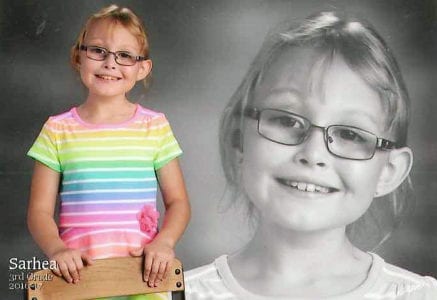There is nothing worse than watching your child go through something excruciating and being unable to stop it.
Sarhea’s Birth Story
On a Tuesday morning, my daughter Sarhea (Suh-ray-uh) was born via emergency cesarean section due to her not responding during labor. Three hours later, she was transferred to Cincinnati Children’s Newborn Intensive Care Unit (NICU). On Thursday morning, still in my own hospital bed, I got a call from the NICU saying that they were rushing my daughter into emergency surgery because they had reason to believe her intestine ruptured.
I insisted on my own discharge and as soon as my paperwork was finished. My husband and I rushed to Cincinnati Children’s to be with our first child. We waited for hours in same day surgery and finally the surgeon came in to talk to us. Sarhea had a volvulus (where the intestine twists over on itself and cuts off blood supply) due to meconium ileus. He had to remove 12 inches of her small intestine and nine out of ten times, he sees this with cystic fibrosis.
Sarhea’s Diagnosis: Cystic Fibrosis
This was only the second time I had ever heard the term. The first time was a very brief encounter I had at my previous job at a respiratory pharmacy. My child was officially diagnosed with cystic fibrosis, a fatal genetic disease, nine days later. She stayed in the NICU for 146 days.
Cystic fibrosis (CF) affects the lungs, liver, gallbladder, intestines, pancreas, sinuses and reproductive tract. Thick, sticky mucus builds up trapping bacteria, causing infections, obstructions, and irreversible lung damage. The pancreas does not release enzymes to break down food when a person with CF eats (there are a few exceptions, but the majority are pancreatic insufficient). So they deal with malabsorption issues and poor weight gain.
Add that to a baby already missing a foot of her small intestine, and that was what our beautiful baby girl faced before she was even two weeks old. She needed a feeding tube placed into her nose and down into her stomach. She could not eat too much at a time, so a feeding pump was used to regulate the amount of food to her intestines.
When Sarhea was two months old, we had a gastrostomy tube placed to get the tube out of her nose. She was hooked up to her feeding pump for 24 hours a day. That in itself was a lot to manage along with dealing with everyday life.
Sarhea Today
We managed though and today Sarhea is a spunky, bright, charming, and amazing nine year old. She
was able to get her g-tube removed two years ago. But there is still a possibility it will need to be replaced if she is unable to get enough calories by mouth to continue to grow.
I now work in the radiology department and over the years, I have met several families whose children have short bowel syndrome. The causes range widely. I was also recently watching an episode of “Monsters inside me” on Animal Planet and there was a boy who ingested magnetic beads and did so much damage to his bowel, they had to remove all but 10% of his small intestine.
Can you imagine if there was a way scientists could grow human intestine in a laboratory, made up with a persons’ own DNA so functioning intestine could replace damaged or dead tissue? They wouldn’t have to wait for a donor, worry about rejection medications, or other complications from transplant. Can you imagine my amazement when I found out that this is a growing possibility?
How New Research Could Impact Kids with Intestinal Disorders
This research is happening at Cincinnati Children’s as I write. In fact, a recent study published in Nature Medicine has found an unprecedented approach to engineer and study tissues in the intestine. The hope is that one day this technology will allow scientists to grow a section of healthy intestine for transplant into a patient. (More info in the video at the top of this post).
This research makes me feel hopeful when I think of all of the children who will be born with meconium ileus, Hirschsprung disease, Crohn’s disease, dysmotility issues, and other intestinal disorders. I think of all of those days with Sarhea in the NICU and at home with the feeding tube and all of the issues that we had.
We have had to fight so hard to keep her alive at times. Some parents have lost their children due to complications of transplant and others who were unable to make it until transplant was available. I think about how many lives will be saved. How many kids will be able to live a long life with a more normal childhood, despite having medical issues when they were babies.
This research is going to give so many children with intestinal disorders the possibility of a future and so many parents the opportunity to watch their children grow and thrive.

Thank you for sharing your story and helping us. My son Trennor was born with Short Gut(along with Cloacal exstrophy) and I pray that she continues to get enough to calories to grow! You and you family are amazing and strong even on the bad days!